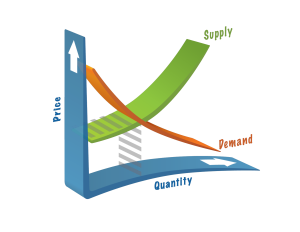
10 Most Important Economics Concepts
1. Choice: In simple term this is the most important economic concepts & fundamental for understanding economics. If we take the holistic approach, the whole basis of economics depends on the concept of scarcity. In economics it’s assumed that the resources are scarce and thus for having something we need to let go of something, that’s where the concept of exchange begins. When we buy a product, we choose the product by letting go of the money that we pay. It introduces the concept of ‘choice.’ Here we need to remember that ‘choice’ is completely dependent on ‘scarce’ resources. If scarcity is not there, there is no compulsion for choices as well!
2. Opportunity Cost : Another economic concepts is Opportunity Cost. When we choose we let go of another opportunity by availing one! Think, if you wouldn’t buy the product you’re buying right now, what could you do with the money available? You might have done something else or have something else! But as you’re going for this product, you’re costing yourself that much which you’re willing to pay to buy this product. From scarcity, choice begins, and from choice opportunity cost arises!
3. Interest Rate: Interest rate is one of the most important measuring grids for understanding economics. When RBI/Federal Bank increases the interest rate in an economy that means they want to suck out the money out of the economy and vice versa. Other than affecting the money supply in an economy, interest rate affects the investment decisions of an investor and also helps to understand the risk associated with it. And interest rate also describes the opportunity cost in percentage and how much you’re forgoing for your choice!
4. Demand: In demand there are four things that are important to understand –
- Willingness to buy a product
- Ability to buy a product or purchasing power
- Within a stipulated time period
- Other factors remain constant
So, demand is the willingness and ability to buy a product within a stipulated time period when other factors remain constant. The concept of demand is directly linked with the concept of choice, scarcity, opportunity cost!
5. Supply: Supply also includes four things which can be discussed as follows –
- Willingness to sell a product
- Being able to sell a product or to be able to find a customer
- Within a stipulated time period
- Other factors remain constant
Thus, supply is the willingness and ability to sell a product within a period of time when other factors remain constant!
The concept of supply comes from the concept of demand. When the demand is created there must be a product to satisfy the demand of the customer and the willingness and ability to sell it to its potential consumer!
6. Market : A market is a place where demand and supply meet and find its optimum point. Buyers have the need for products, sellers have the need to provide their products and the place where they exchange between themselves we call it market. And when the number of buyers, sellers varies or the product varies or the ability to provide solutions varies, it creates different structure which we call market structure such as monopoly, oligopoly, monopolistic, perfect competition!
7. Competition: Competition is one of the most significant concepts in economics. On the basis of competition the products and price of the products have to go through a comparative analysis done by buyers, sometimes sellers. Competition is nothing but a cold war to pop up head to announce I am better than the other. The fundamental of competition facilitates in understanding the market structure and how an overall economy is going!
8. Equilibrium: The purpose of economics is to create maximum output for everyone out of scarce resources! And where it is achieved that’s called equilibrium – the optimum point. Above and under which there is a mismatch of demand and supply, input and output, expenditure and benefits, employment and availability!
9. Price : Price is the exchange rate, the equilibrium point and the originated value stemming from demand and supply where buyers are ready to forgo that much of money to have the product and the seller is ready to let go of his product at the same! Thus price in economics determines a lot of things. It judges the scarcity of resources, choices we make, controls demand and supply, create and change equilibrium point, generate different market structure and produces different opportunity cost!
10. Macro & Micro : The concept of micro is about how only one firm or individual decides to allocate the scarce resources and how it affects the firm and the individual, whereas macro economics is not only about a firm rather it’s about a whole economy in aggregate! Macro is a holistic approach whereas micro is the last box within a dozen of boxes! Understanding micro and macro concepts help a beginner to understand economics well and make the base stronger!
In Conclusion
The above 10 economic concepts might not be the only important concepts, however they are most important as the whole basis of economics concepts and structures depend on them. Thus, to begin with economics don’t forget to keep these 10 little concepts handy.
